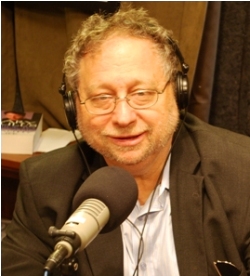From Journalism to Jingoism |
"Those guilty of Tuesday's attack should pay. But hunting monsters is risky business. The danger isn't that the monster will catch you, but that you won't know when you have become one yourself." - Robert Kirby, columnist, 9/16/01
The 9/11 attack, responsible for devastating the Twin Towers and the World Trade Center in New York, also claimed another casualty - American journalism, trapping it in a conflict between its duty to inform the public and its desire to be popular by promoting patriotism.
This conflict did not go unnoticed but it was largely un-discussed in the media, which to this day 9 years and tens of thousands of casualties later, has only changed in one way - with less coverage on a daily basis.
Then CBS news anchor, Dan Rather, talked about it in 2002 but not on his network in America. Appearing on BBC's Night talk across the ocean in London, he said: "Limiting access, limiting information to cover the backsides of those who are in charge of the war, is extremely dangerous and cannot and should not be accepted."
"And I am sorry to say that, up to and including the moment of this interview, overwhelmingly it has been accepted by the American people. And the current administration revels in that, they relish that, and they take refuge in that."
Within a few years, after a questionable incident blown out of all proportion, Rather was dropped by the CBS. Few other insider voices then followed his example - perhaps for obvious reasons.
I was in New York that fateful Tuesday, and watched the coverage with increasing alarm - an alarm that has not abated over all these years. Being a news analyst known as the News Dissector, I began watching religiously, armed only with a remote control. I scrolled the channels only to find sameness of pro-government orientation with critics banned from the airwaves.
In America, it was like that in the early days of the Vietnam conflict, and later, in much of the coverage of the Gulf war. And now, once again, with some distinct differences, in Afghanistan and other fronts in the still expanding 'war' against terrorism. The difference today, despite all the new technologies, hundreds of news channels and diverse views instantaneously available through the Internet, is nothing but an even graver situation on the information front.
We have more media and less understanding. Yes, I know how imprecise the term 'media' has become since we are all exposed to information of all kinds, online and offline, analog and digital, broadband and satellite, in the traditional press and conventional television newscasts as well as in a proliferating array of magazines, web sites, zines, videos and films. What is called news pours into us, and through us mediated through more technologies and 'platforms' that I can keep up with. And, yet, at a time of deepening crisis, when responsible media is needed more than ever, so much of it is failing us all the same.








 News Director Danny Schechter is an author, blogger and filmmaker. He edits Mediachannel.org, a global media issues network and directs films. His latest Plunder: The Crime of Our Time treats the financial crisis as a crime story. He can reached at
News Director Danny Schechter is an author, blogger and filmmaker. He edits Mediachannel.org, a global media issues network and directs films. His latest Plunder: The Crime of Our Time treats the financial crisis as a crime story. He can reached at 